Music journalism is broken. Is this how we fix it?
A new report confirms everything I've been saying about the bleak state of local arts coverage. Crucially, it offers a solution.
Imagine you did a job you loved for more than 20 years.
Over that time, you progressed. You gained knowledge and experience.
You built a career full of highs – and, let’s be honest, a handful of lows too.
After two decades, after some lucky breaks and excellent mentoring along the way, you got pretty good at that job.
Some might say you became an expert.
What if, after those 20 years, you pivoted to a new job.
For this new role, you spent your time discussing the fact that the job you used to do no longer exists, and that your former industry is in tatters.
What if you became the reluctant spokesperson for that situation?
Bleakest pivot ever, right?
I’m telling you this because that’s exactly what I’ve been doing lately.
It started last Monday when Wallace Chapman invited me to appear on The Panel.
I told him this: “It’s a shame our music journalism industry has collapsed.”
On Wednesday, I appeared on the NZ Herald podcast The Front Page.
I lamented to host Damien Venuto: “I kind of have to catch myself because I find it a little depressing.”
On Sunday, I recorded an interview with Mediawatch and said to Hayden Donnell: “I don't want to be doing this. I don't want to be talking about this.”
Then I had a chat with Duncan Greive for The Spinoff podcast The Fold.
I stated: “If you don’t see [our artists] on the pages of the Herald or on Stuff next to All Blacks, politicians, business [leaders], whatever, then you’re saying it’s not as important.
“That’s the big loss there. It’s almost a statement, like, ‘This doesn’t matter’.”
I never thought I’d have to make so many media appearances.
But then, I never thought I’d spend 20 years being a music and entertainment journalist, only to then start covering the death of local music journalism.
I know there’s irony here.
That publications that once covered music trends and new artists rigorously now get clicks out of covering the lack of mainstream music coverage.
That I got to experience the kind of wide-ranging publicity tour that artists used to enjoy, stopping in and chatting to several different podcasts and radio hosts.
It isn’t lost on me.
Yet, here we are.
I’m starting to feel like the grim reaper.
‘You're not talking to Tova O'Brien about the death of political coverage’
How did I end up here?
Great question.
It started with a rant about two local music festivals – First Listen In, then Eden Festival – that received zero coverage from any major media publications.
I’ve continued that coverage, wondering why Rodney Fisher can’t get anyone to review his new album, and why no one has mentioned the 80+ music festivals happening this summer.
I’ve also covered things journalists at mainstream media outlets used to point out, like the lack of diversity on those lineups, ticket price rises and nostalgia trends that are driving tours and sales.
I didn’t think my work would blow up the way it has. I never thought I’d be asked to appear on so many podcasts and news shows to discuss this topic.
Normally, I’d turn them all down. I’m camera- and microphone-shy. I might be a journalist, but I’m not used to being front and centre of a story. That’s not how it should work.
I don’t want to be talking about this. It’s just too bleak.
But I talked myself into it. I had to. Someone needs to start the discussion, to point things out, to stand up and ask the questions that need to be asked.
Like, what are we doing here?
Is this what we want?
"You're not here talking to Tova O'Brien about the death of political coverage, or Dylan Cleaver about the death of sports reporting,” I told Mediawatch.
As I said those words, on the table in front of me was a copy of Thursday’s NZ Herald newspaper, the place I worked for nine years and spent much of that time working on TimeOut, a magazine insert published every Thursday.
Until as recently as 2019, that mag had six reporters working on it fulltime. Now, none of those jobs are left, and the brand barely exists.
The only local entertainment coverage I could find in that paper was a story about a former NZ Idol contestant being sentenced for injuring a police officer after a pursuit.
It’s a stretch to call that an entertainment story.
After all this complaining, I was getting sick of the sound of my own voice.
I felt lonely, like I was ranting into the ether, screaming into the void.
Does anyone else care?
It turns out they do.
‘Coverage is on the edge of collapse’
Late last week, a report came out on this exact topic.
Called New Mirrors, it’s commissioned by Creative NZ, and it backs up everything I’ve been saying.
The timing is impeccable.
Dr James Wenley and Rosabel Tan spent months putting it together, interviewing key industry representatives, artists, musicians, comedians, publicists and journalists.
They asked: What’s going on?
The results are stark. New Mirrors examines exactly what’s happening with arts and culture reporting in New Zealand media, and puts things in context much better than I ever could.
“Coverage is on the edge of collapse,” Wenley said when New Mirrors was released.
“A stark finding in the report was just how many dedicated arts roles and platforms have been lost … when arts and culture is treated as a ‘nice to have’ it gets deprioritised, and this is what we’ve seen play out in the media industry.”
Honestly, their report is incredibly thorough. My coverage is based on my knowledge and experience, but this is backed by in-depth research and interviews with more than 50 industry representatives.
What did they find?
“We’re seeing restructure after restructure, cutbacks, burnout and unsustainable salaries,” Rosabel Tan said when New Mirrors was launched last week.
“It’s alarming how stretched both our media and cultural sectors are … but this is essential work.
“It’s how we tell the story of who we are, and who we want to be.”
I’m going to share a couple of comments included in the report, the ones that were rattling around in my brain as I did all those interviews.
“I’d love to have been an arts reporter, but it was never even an option. Those jobs didn’t exist... [I left journalism because] I had grown tired of seeing all of my colleagues being made redundant and resources and newsrooms being cut to a point where they’re really only resourced to chase sirens now.” -Rosie Dawson-Hewes
“When I started at The Press in 2007, there was an arts editor, two film reviewers, two or three cultural writers, a feature writer who specialised in culture—that’s all gone now. That’s all completely gone. I sort of aspired one day to be an arts editor. That looked like the coolest job in the world. But that ladder I was climbing—they sawed the top off it, as I was climbing. It’s kind of like... oh... okay, cool.” -Charlie Gates
Yikes.
On the one hand, I feel incredibly grateful that I grew up at a time when a career in music and entertainment journalism was an option for a Whanganui kid who was lost and didn’t know what else to do with his life.
On the other, I’m utterly gutted that those same pathways are no longer available to anyone else. There’s no other way to put it: that’s shit.
Ultimately, New Mirrors makes some strong recommendations to rectify the lack of arts coverage in the country.
It wants a dedicated fund for media projects set up, and suggests an Arts Media Centre, like the Science Media Centre, be created as a tool to make reporting on the industry easier.
Are they good ideas?
That depends on which side of the industry you’re on.
I’ve seen commentary from musicians saying it’s pointless, that a few extra stories won’t help them achieve anything, like a record deal, bigger streaming numbers or, you know, getting paid.
For some, that’s probably true.
But I believe in journalism. I believe in the power of telling stories. If those stories are told intelligently, with integrity and intent, by people who know what they’re doing, I believe audiences are there ready and waiting to read them.
As New Mirrors points out, there is value in covering our cultural landscape. If that experience is curated properly, it could work.
As Erny Belle pointed out to The Spinoff, artists are now fighting for attention on social media next to anti-Semitism, conspiracy theories, and brutally graphic war coverage. It’s bleak as fuck.
So I’m cautiously optimistic about New Mirrors. Discussing the problem is surely the only way we arrive at some kind of solution.
It’s a positive that Creative NZ thought this was a topic worth exploring.
Anything is better than nothing, right?
But there’s one piece of information in the report that I can’t get my head around. It’s the annual $5 million price tag its recommendations come with.
$5 million? Under a National/Act/NZ First government? One that seems hellbent on cutting ‘wasteful spending’ so it can offer tax breaks to landlords?
After Winston Peters went on an absolute tear about the PIJF?
That seems … unlikely?
But let’s wait and see.
Thank you for being here and for supporting Boiler Room. If you liked this post, please consider upgrading your subscription. The more that do, the more I can do.

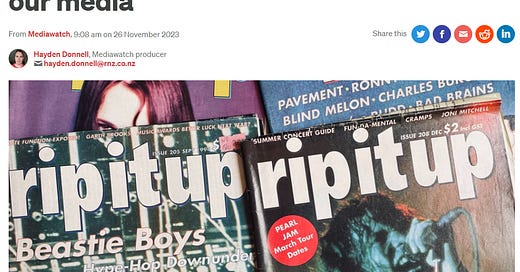



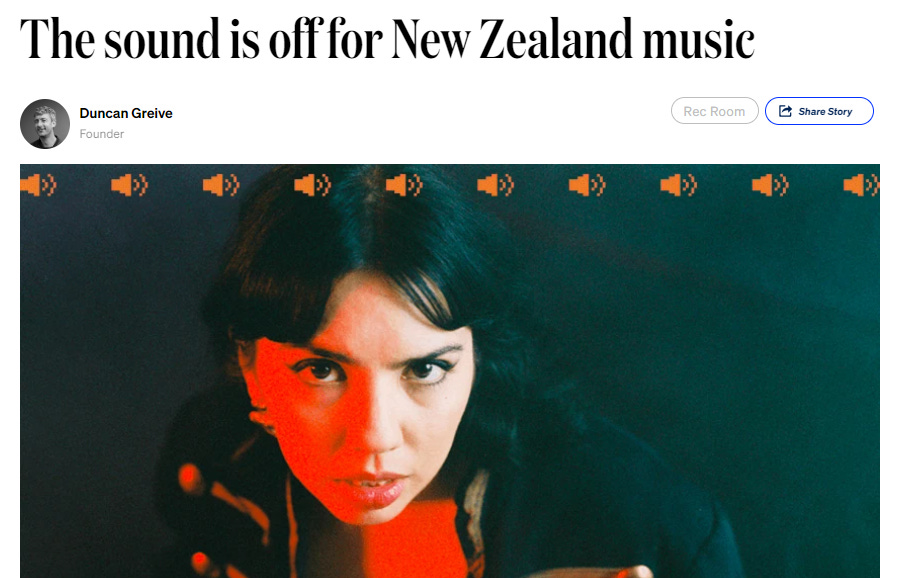
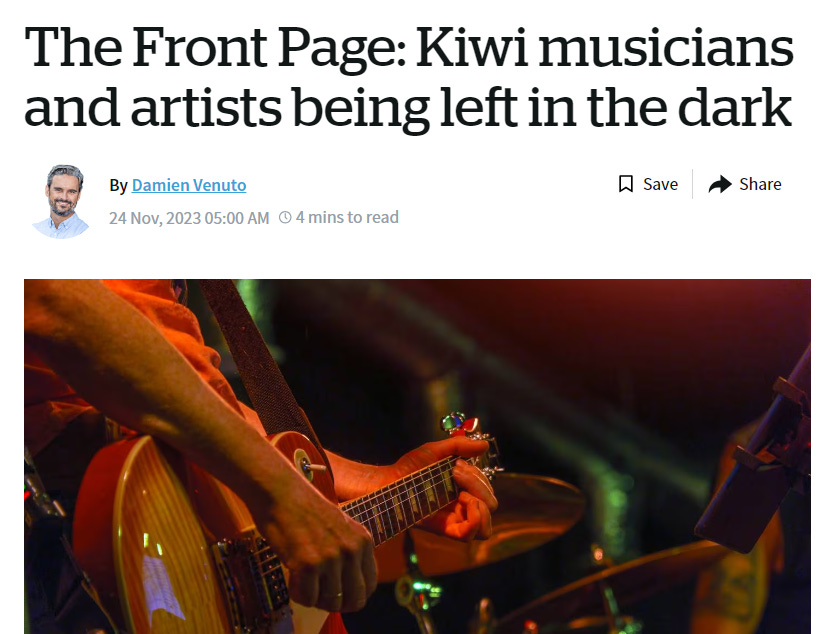
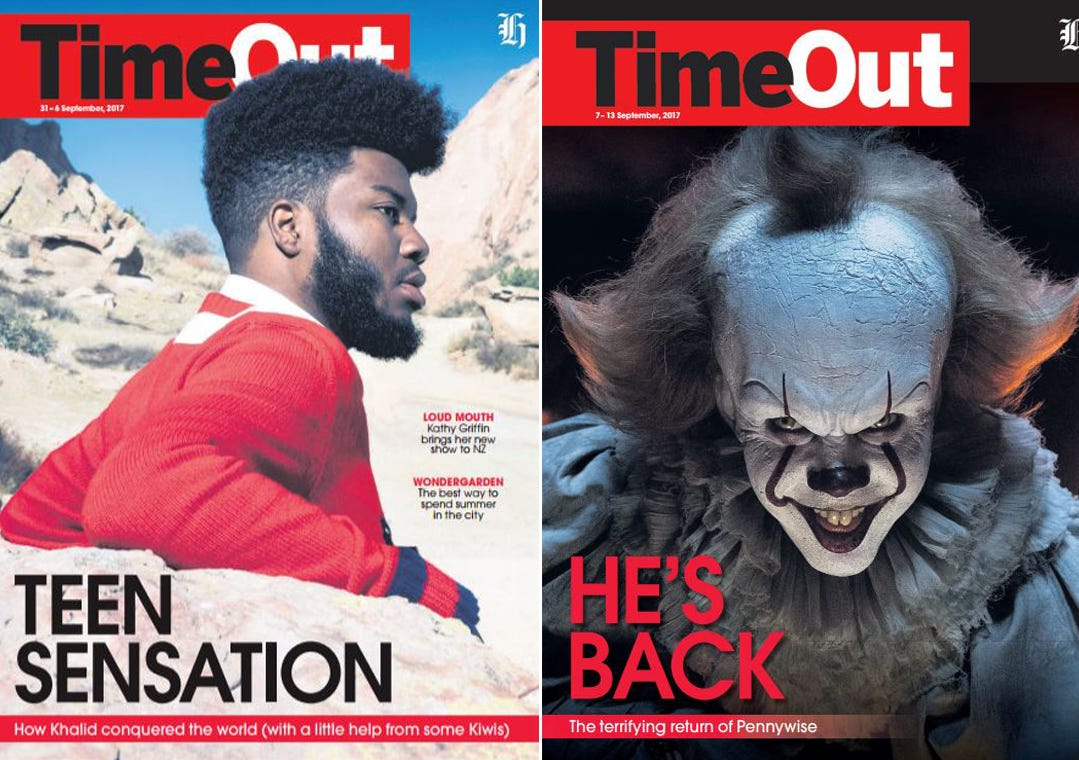
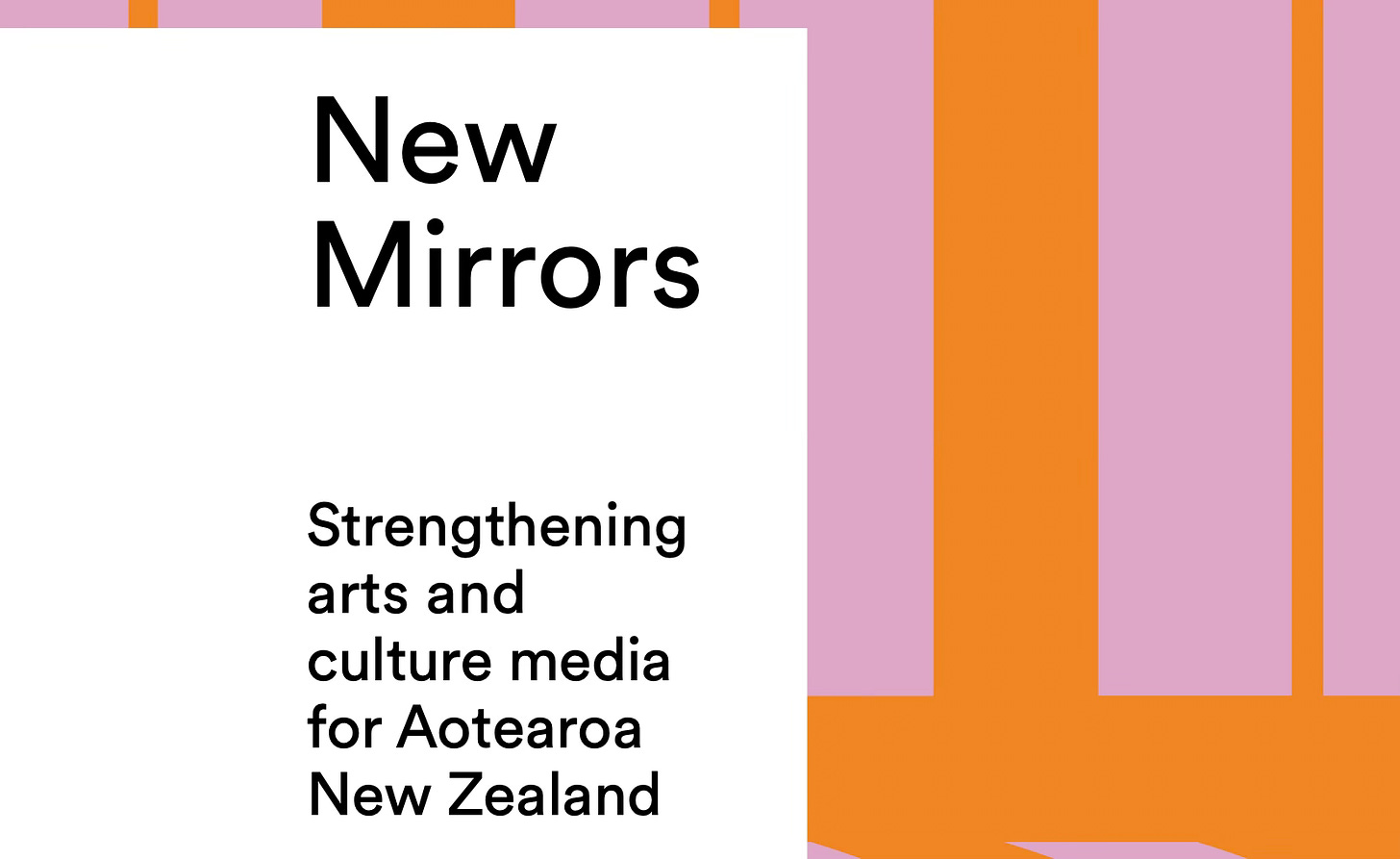
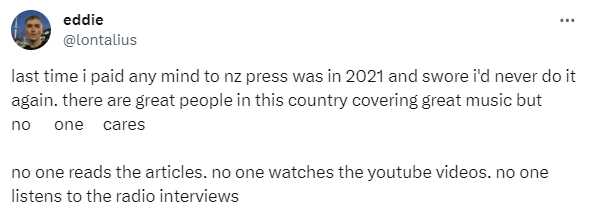
Just thought I'd clarify what I meant by that slightly incendiary tweet - I am a huge believer in music journalism and any sort of arts coverage in the media. It's a big part of how I discover new music, and honestly if I wasn't so busy making music I would probably be trying to write about it.
And I'm obviously extremely grateful for anyone who has ever covered or talked about what I do. I know everyone covering music in NZ is working extremely hard and often in their own time.
My point though, and I think the biggest issue here, is that the audience just isn't there for music coverage in NZ (or anywhere, for that matter). The content being made isn't reaching anyone. I loved the Amplified series that Jess Fu made with The Spinoff this year but most of those videos are sitting at around 500 views. We can't kid ourselves that there are people clamouring to hear about new music in this country.
I was angered by the response to the article because I feel everyone is missing the point. More music coverage in NZ would be fantastic, but it would mean very little. It doesn't change the reality for artists.
I truly believe, or maybe it's just hope, that the role of the music, arts, entertainment journalist will again become key to our ability to participate in this world. Why? Because there is too much, and it's too easy to 'create, and I'm too busy to take the time to understand the context/history/nuance of it all. And eventually, we'll become tired of trying to figure this out ourselves and look back to the professionals/experts in the field to guide us through it.
It's that time of year where the old spotify wrapped comes out - and mine is going to basically be the same as last years, and the year before. The effort to go through what feels like all of the world's music, is just too much - so i go back to what I know and love - guaranteed enjoyment with no risk. It's the same with netflix. It's the same with everything.
That's not what I want - I want to be exposed to new music, and new arts, and new experiences. And we'll again turn to writers, commentators and experts in this field to support us to find those amazing things. Hopefully, there'll still be people around to do that for us.
We won't find in on 'mainstream' media channels, for now at least. Substack and the like will play a critical role in fixing music journalism. Writers like yourself will keep fighting the good fight, and eventually the 'mainstream' outlets will look up and start using it for their channels (like we see with Dylan Cleaver, and Bernard Hickey), and it'll breathe new life into the whole scene.
I'm being naive. I'm being overly optimistic in the face of the evidence. But i have to believe that I won't be listening to NOFX forever - I just need someone to hold my hand.